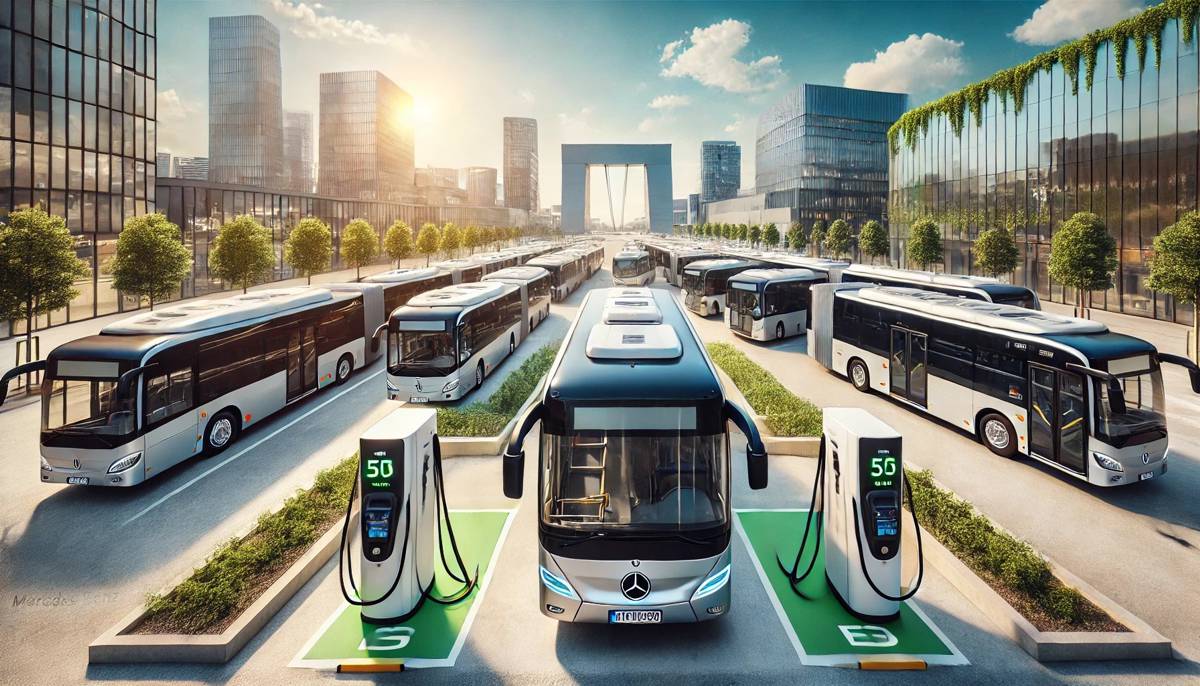ChargePoint and Daimler Buses forge alliance for seamless EV Fleet Management
ChargePoint, a leader in networked electric vehicle (EV) charging solutions, is taking another significant step in the evolving world of electric transport.
The company has announced a strategic partnership with Daimler Buses, aimed at seamlessly integrating ChargePoint’s advanced telematics and charge management systems with the Mercedes-Benz and Setra brand buses. This collaboration promises to reshape fleet management, making it smarter, more efficient, and above all, more sustainable.
Bringing Smart Technology to Bus Fleets
In a market where fleet operators are increasingly seeking smarter solutions, the partnership between ChargePoint and Daimler Buses is a timely response. With this alliance, ChargePoint’s sophisticated software will now interface directly with the telematics systems of Mercedes-Benz and Setra buses. This seamless integration is expected to bring immediate benefits to operators who are managing both pure electric and mixed fuel fleets.
“Over 9,500 buses use the ChargePoint fleet management system globally, many of which are made by Daimler Buses,” said Uwe Münch, Director for Bus & Transit, Europe, at ChargePoint. “With this new partnership, customers of both brands benefit from enhanced software to optimise their pure electric and mixed fuel fleets. Daimler Buses operators who wish to use our telematics and charge management solution will benefit from the partnership.”
This integration means fleet managers no longer need to juggle multiple platforms or invest in additional telematics hardware. Instead, they gain access to a comprehensive system that monitors, manages, and reports in real-time, all from a single user-friendly interface.
Data-Driven Decisions for Efficient Operations
At the heart of this partnership is ChargePoint’s fleet and charge management system, a tool designed to leverage real-time data to optimise fleet performance. From monitoring battery health to predicting maintenance needs, the software provides actionable insights that keep fleets on the move with minimal downtime.
“ChargePoint’s fleet and charge management systems analyze real-time data, providing a service which is crucial to operating a diverse fleet efficiently and scaling that fleet’s EV population,” Münch added. This new alliance simplifies the onboarding process, making it quick and cost-effective—often just a matter of minutes.
Fleet operators are given the tools they need to make informed, data-driven decisions. For instance, real-time insights and advanced reporting capabilities enable fleet managers to anticipate issues before they arise, reducing operational costs and enhancing overall fleet performance.
Enhancing the Data-as-a-Service Ecosystem
Daimler Buses has long been a pioneer in the automotive sector, and this partnership marks another step in its journey towards digital transformation. With the integration of ChargePoint’s technology, Daimler Buses is expanding its Data-as-a-Service (DaaS) ecosystem, ensuring that its customers have access to the most secure and user-friendly solutions available.
Bernd Mack, Head of Customer Services & Parts and Used Vehicles at Daimler Buses, expressed his enthusiasm: “I am very pleased that, in ChargePoint, we were able to gain a partner for our Data-as-a-Service ecosystem. The partnership with ChargePoint is a further important component in making the use of vehicle data as easy and secure as possible for our bus customers.”
By tapping into ChargePoint’s robust analytics and reporting capabilities, Daimler Buses can provide operators with more granular insights into vehicle performance, energy consumption, and driver behaviour. This level of detail helps operators optimise routes, reduce fuel consumption, and ultimately, improve the overall efficiency of their fleets.
Simplifying the Path to Electrification
The move to electric is not just a trend—it’s a necessity for the future of transport. For many fleet managers, the shift can be daunting, especially when it comes to navigating the complexities of charging infrastructure, energy management, and data analytics. However, ChargePoint and Daimler Buses are making this transition easier than ever.
For ChargePoint customers operating Mercedes-Benz and Setra buses, the new partnership offers a unified system that integrates both vehicle telematics and charge management. This approach eliminates the need for additional hardware and provides a seamless experience that simplifies fleet operations.
Likewise, for Daimler Buses customers looking to utilise ChargePoint’s software, the benefits are immediate. With one comprehensive solution, they can streamline their processes, reduce costs, and focus on what they do best—moving people safely and efficiently.
Building a New Fueling Network for the Future
Since 2007, ChargePoint has been on a mission to create a world where people and goods move on clean electricity. Today, it’s one of the largest EV charging networks globally, with a presence in hundreds of thousands of charging locations across North America and Europe.
ChargePoint’s platform offers flexibility, catering to various charging scenarios from home and multifamily dwellings to workplaces, parking facilities, retail spaces, and transport fleets. Whether it’s a small business or a major transit operator, ChargePoint’s scalable solutions are designed to meet the unique needs of every customer.
With its cloud subscription platform and software-defined charging hardware, ChargePoint is helping to build a new fuelling network that is clean, efficient, and sustainable. And now, with the support of Daimler Buses, it’s set to make even greater strides in advancing the adoption of electric vehicles across the globe.
A More Sustainable Future
Looking ahead, the partnership between ChargePoint and Daimler Buses represents a significant step toward a more sustainable and efficient transport sector. By integrating smart data management with cutting-edge charging technology, the two companies are helping fleets make the transition to electric easier, faster, and more cost-effective.
As electric vehicles become more mainstream, and as cities and countries continue to push for greener, cleaner transport solutions, this partnership stands out as a model for collaboration in the EV space. It’s not just about reducing carbon emissions or cutting costs—though those are important benefits. It’s also about creating a future where transport is safer, smarter, and more sustainable for everyone.





























